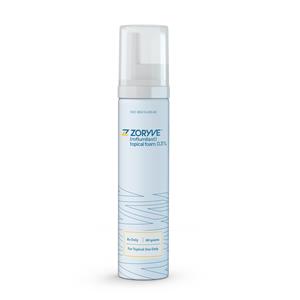The U.S. Food and Drug Administration (FDA) accepted Arcutis’ supplemental New Drug Application for roflumilast foam (Zoryve) for the scalp and body psoriasis in adults and adolescents ages 12 and up.
The Prescription Drug User Fee Act (PDUFA) target action date is set for May 22, 2025.
Roflumilast foam 0.3%, a once-daily, next generation phosphodiesterase-4 (PDE4) inhibitor, is indicated for the treatment of seborrheic dermatitis in adult and pediatric patients and older. Roflumilast cream, 0.3%, is approved for topical treatment of plaque psoriasis, including intertriginous areas, in adult and pediatric patients aged 6 and older, and roflumilast cream, 0.15%, is indicated for topical treatment of mild to moderate atopic dermatitis in adult and pediatric patients aged 6 and up.
“In clinical studies, investigational once-daily ZORYVE foam has demonstrated significant improvements in psoriasis signs and symptoms, effectively and reliably improving both scalp and body psoriasis across all efficacy endpoints compared to vehicle,” says Jennifer Soung, MD, Director of Clinical Research at Southern California Dermatology, and clinical trial investigator, in a news release. “Almost half of individuals with plaque psoriasis experience it on their scalp, accompanied by itchy and sometimes painful plaques, often along with plaques elsewhere on the body. Scalp symptoms can be especially burdensome to manage because hair-bearing areas present unique challenges in terms of treatment application that are not easily addressed with traditional creams or ointments, as they can be inconvenient and messy when used to treat scalp psoriasis. The unique formulation of ZORYVE foam is potentially a transformative new treatment option, if approved, for those living with scalp and body psoriasis.”
The sNDA is supported by positive results from Arcutis’ pivotal ARRECTOR Phase 3 trial, a Phase 2b study, and long-term efficacy and safety data generated from the roflumilast cream development program in plaque psoriasis.
The “A Randomized tRial Employing topiCal roflumilasT foam to treat scalp psORiasis” (ARRECTOR) study was a parallel group, double-blind, vehicle-controlled pivotal Phase 3 study of the safety and efficacy of roflumilast foam 0.3% or a matching vehicle administered once-daily in individuals ages 12 and older with plaque psoriasis of the scalp and body (n=432). The study met its co-primary endpoints with 66.4% of individuals treated with roflumilast foam achieving Scalp-Investigator Global Assessment (S-IGA) Success (IGA Success is defined as an IGA score of ‘clear’ or ‘almost clear’ plus a 2-point improvement from baseline) compared to 27.8% of individuals treated with a matching vehicle foam at Week 8, and 45.5% of individuals treated with roflumilast foam achieved Body-Investigator Global Assessment (B-IGA) Success compared to 20.1% of individuals treated with a matching vehicle foam at Week 8.
Two thirds (65.3%) of roflumilast-treated patients with clinically meaningful itch at baseline achieved a clinically significant reduction in itch compared to 30.3% of vehicle-treated patients at Week 8 as measured by a ≥ 4-point change from baseline in Scalp Itch-Numeric Rating Scale (SI-NRS). Importantly, some patients experienced rapid relief in scalp itch 24 hours following first application compared to vehicle.
In addition, improvement in body itch as measured by the Worst Itch-Numeric Rating Scale (WI-NRS) was also observed at Week 8, with 63.1% of those treated with roflumilast foam achieving a ≥ 4-point reduction in WI-NRS compared to 30.1% of those treated with vehicle.
Roflumilast foam 0.3% was well tolerated. The incidence of Treatment Emergent Adverse Events (TEAEs) was low and generally similar between active treatment and vehicle, with most TEAEs assessed as mild to moderate severity. Overall, the most common adverse reactions for roflumilast foam in the phase 3 and phase 2b studies (≥1%) included headache (3.1%), diarrhea (2.5%), nausea (1.7%), and nasopharyngitis (1.3%). Rates of discontinuation due to adverse events were low and similar among roflumilast-treated and vehicle-treated patients in pooled vehicle-controlled studies.
“ZORYVE foam, if approved, would represent a truly meaningful innovation for millions of people with scalp and body psoriasis whose symptoms have not been adequately addressed by existing treatments,” adds Frank Watanabe, President and Chief Executive Officer of Arcutis. “We look forward to working closely with the FDA during the review process for our fifth topical roflumilast regulatory submission in the United States in less than three years. This filing acceptance is a critical milestone in our mission to deliver new treatment options that address the urgent needs of individuals living with immune-mediated diseases and conditions.”


